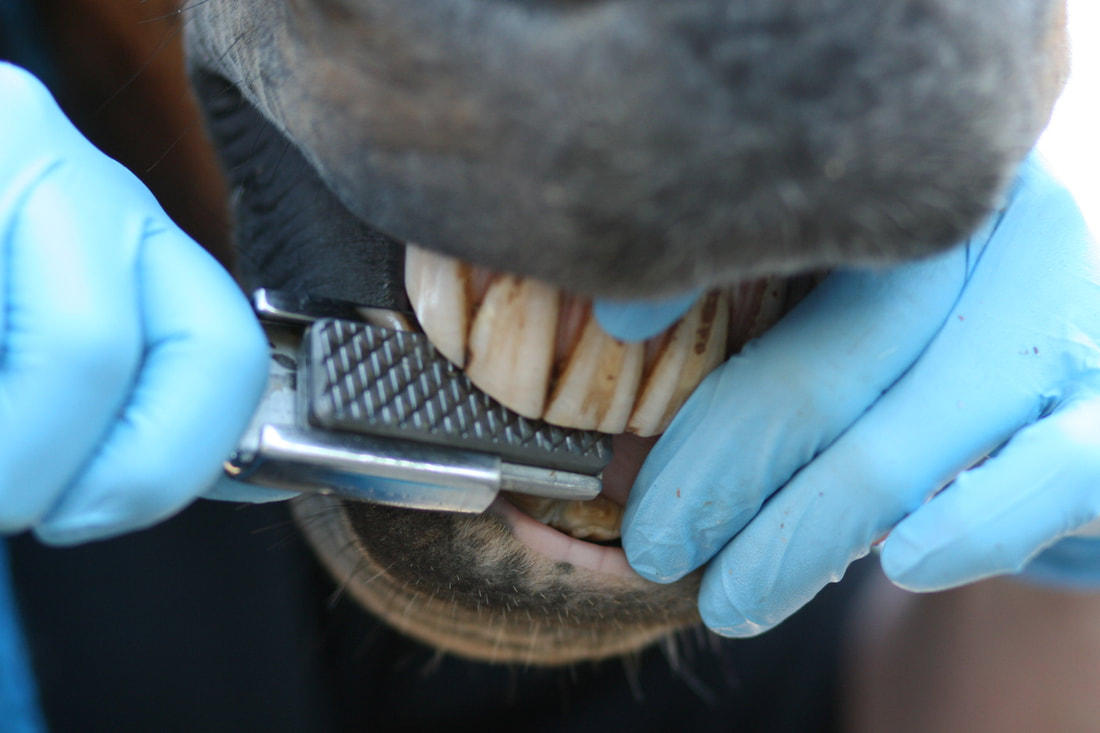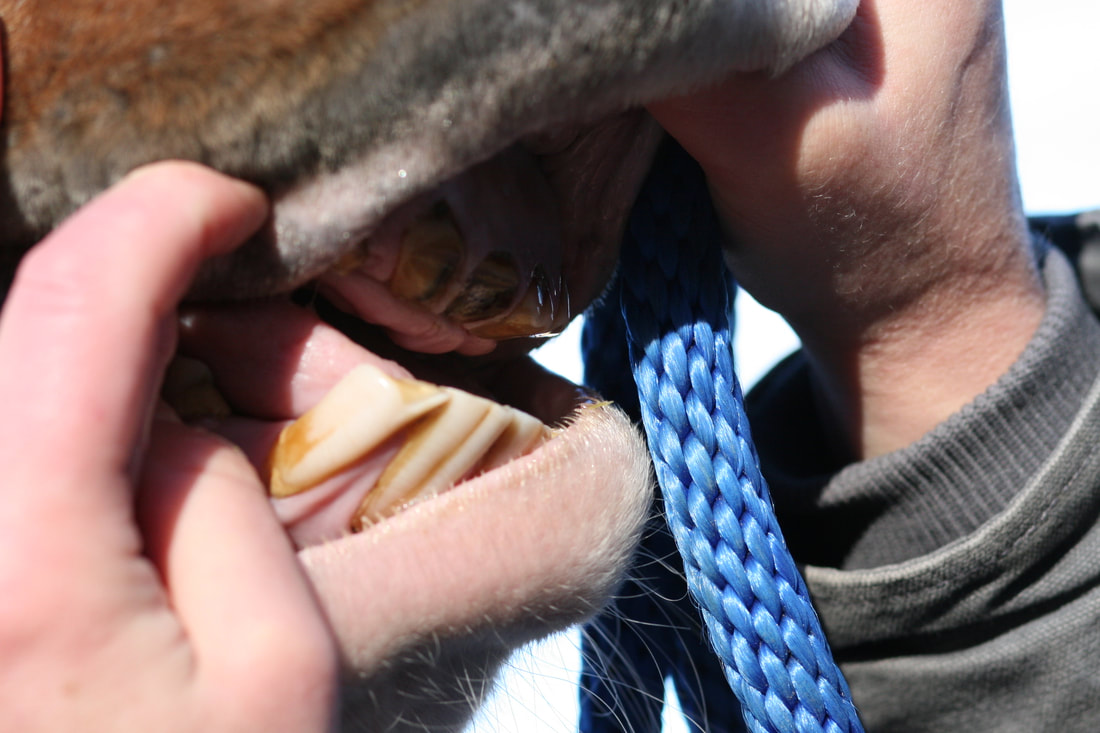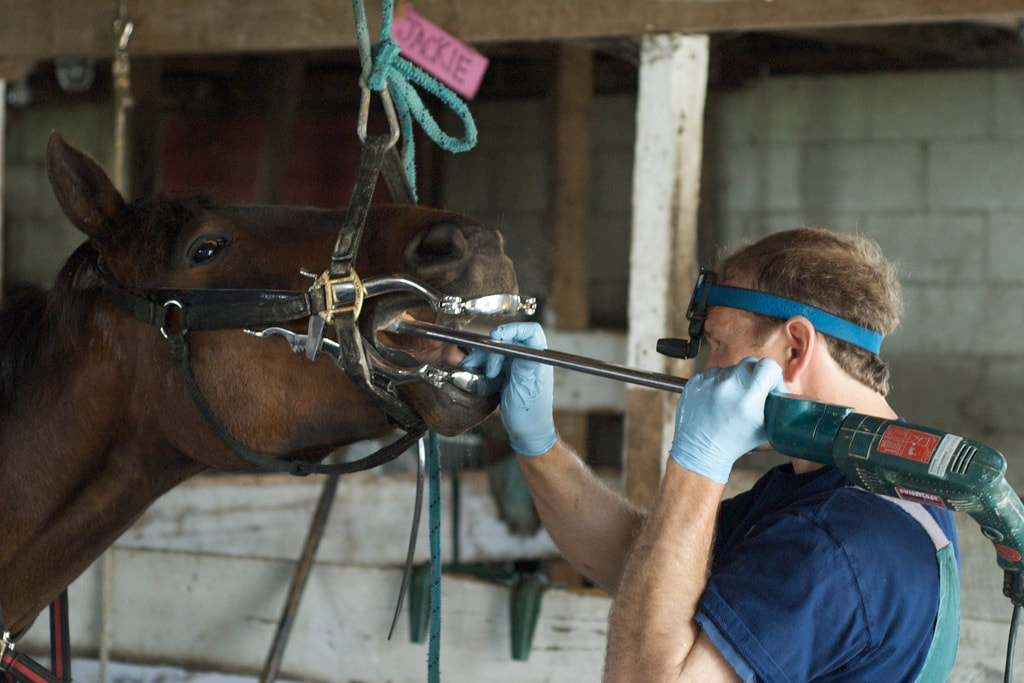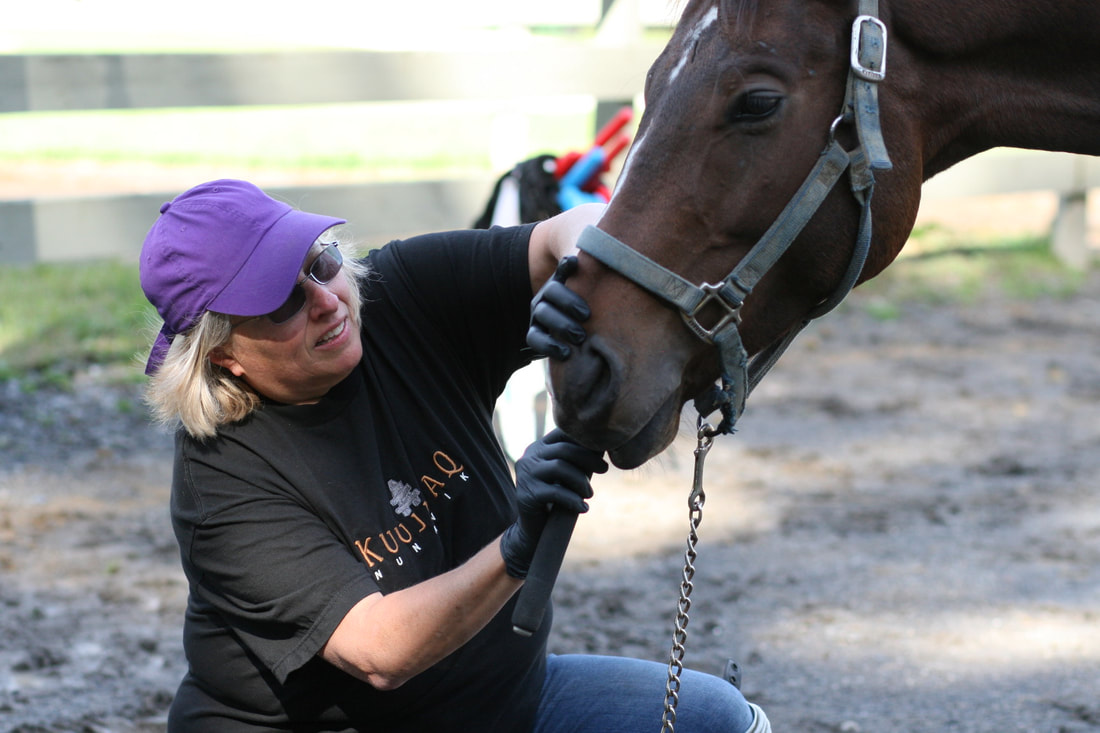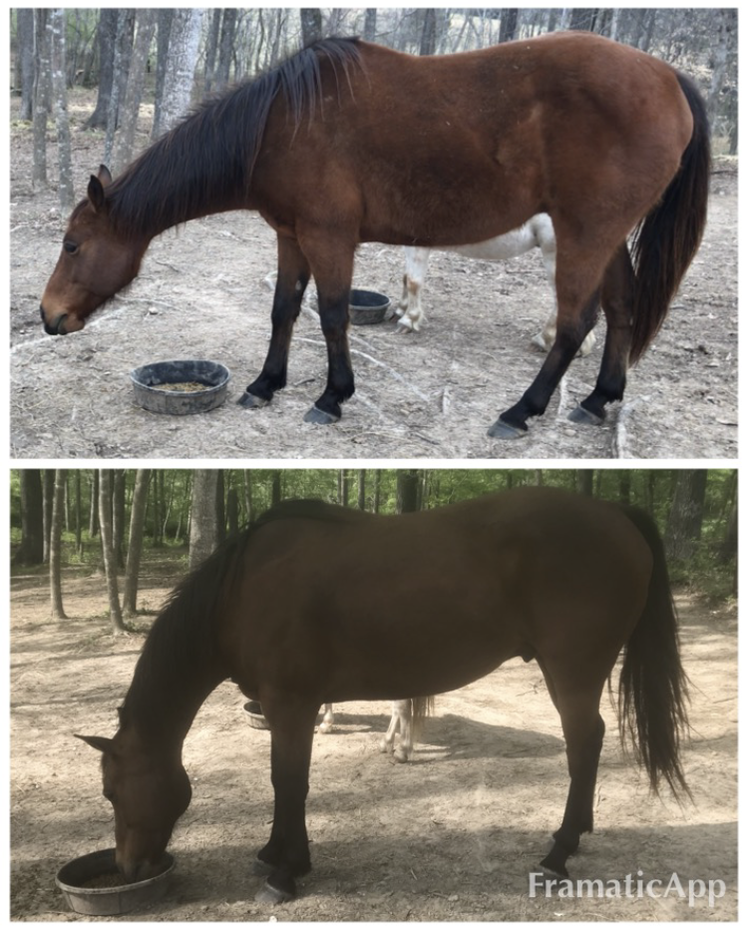FAQ
Why are incisors important?The goal of Neuromuscular Based Horse Dentistry™, is to maintain or restore the biomechanical function of a horse’s temporomandibular joint (TMJ) to maximize the horse’s whole neurological functioning.
Balancing a horse starts by adjusting the inclination of its incisors, as they provide the guidance for the rotation of the TMJ. Adjusting the inclination of its incisors allows the horse a full range of motion (anterior/posterior and lateral) for both its jaw and its whole body. The TMJ is considered to be anatomically aligned when the incisors have optimal surface-to-surface contact, with an angle ranging from eight to ten degrees. If balance is maintained, the horse will keep its clinical crown length at an angle found in a 5-year-old horse. Eruption (tooth growth) without proper wear leads to unnatural length and angle of the incisors and changes the biomechanics of the jaw. Changes in the rotation of the jaw and TMJ cause many postural imbalances as well as neurological dysfunctions. It is important to note that each horse is an individual and therefore should be adjusted individually, as appropriate. |
Isn't power floating easier?
|
Power floating is the use of a rotating blade or disk on the end of a drill to file horses' teeth. Although many choose to use this method, we believe that it is not beneficial to a horse's dental condition and overall health. Here's why:
1. Equine power instruments are unwieldy so it is very difficult to be precise and make minor adjustments. Because the abrasives act so much faster than hand floats, there is also a very real danger of changing too much too fast. Doing this can cause long-term neurological damage and structural damage to the teeth that may not be correctable depending on how long power instruments have been used. 2. More sedation must be used due to the unnatural position the horse is made to stand in for power floating. Lifting a horse’s head using ropes, pulleys or a dental stand puts its jaw in an unnatural posterior position. Therefore, their teeth will be balanced to an anatomically incorrect position. 3. Power instruments commonly introduce fear in horses. The need for mechanical aids, specialized equipment and excess sedation as described above is often the direct result of having to restrain a fearful horse. For more information on the effects of power floating, read this article: Power floating and equine dentistry |
Traditional equine dentistry
Natural Balance dentistry
|
What can you do for my old horse?
From the age of 20 and up, a horse's body and joints have completely adapted and worn to that individuals posture, the eruption rate of their teeth has slowed to only 1mm or less per year, and their TMJ is in a permanent position. By age 25, they have stopped the eruption process*.
At this point, whatever teeth an older horse has left we want to keep for as long as possible. Whatever imbalances an old horse has are what support its TMJ and the rest of its body, so changing their dentition could cause neurological imbalances, muscle soreness or even dislocation of joints. Small adjustments can be made with the utmost of care, but in many circumstances, it is best to leave what they have!
As a horse gets older its teeth slowly expire. As this is happening, some teeth might become loose which makes them sensitive during chewing. Sometimes all these teeth need are a little encouragement to fall out and it will give the horse a ton of relief!
Once a horse starts losing teeth, it is possible that the remaining teeth will erupt into the gum on the opposing arcade. If there is a tooth causing tissue damage, this is the only time we will work on an old horse.
Bodywork, equine therapies and feed changes are also something that can greatly benefit a senior horse. Practitioners can give you recommendations on what will benefit your horse the most!
* It is important to note that horses who have been aggressively floated during their lifetime may run out of eruption at a younger age.
At this point, whatever teeth an older horse has left we want to keep for as long as possible. Whatever imbalances an old horse has are what support its TMJ and the rest of its body, so changing their dentition could cause neurological imbalances, muscle soreness or even dislocation of joints. Small adjustments can be made with the utmost of care, but in many circumstances, it is best to leave what they have!
As a horse gets older its teeth slowly expire. As this is happening, some teeth might become loose which makes them sensitive during chewing. Sometimes all these teeth need are a little encouragement to fall out and it will give the horse a ton of relief!
Once a horse starts losing teeth, it is possible that the remaining teeth will erupt into the gum on the opposing arcade. If there is a tooth causing tissue damage, this is the only time we will work on an old horse.
Bodywork, equine therapies and feed changes are also something that can greatly benefit a senior horse. Practitioners can give you recommendations on what will benefit your horse the most!
* It is important to note that horses who have been aggressively floated during their lifetime may run out of eruption at a younger age.
(Left) Tooth that is yet to erupt (under the gum line) in a 5 year old. (Right) Tooth that is yet to erupt in a 20 year old; only small roots left.
Wild horses don't have dentists?
Good question! Here are a few reasons why:
1. Wild, or feral, horses eat with their head in a lowered position (grazing) for an average of 20 hours a day. During that time, their jaw is in a natural position and they are chewing, which helps naturally wear their teeth. Their incisors erupt and wear simmaltainiously to maintain the length and angle of a 5 year old horse their entire life. Unlike the domesticated horse, who becomes "long in the tooth".
2. Unlike the hay we feed domesticated horses, the grasses they eat are high in silica. This is a natural abrasive, which also helps in the wearing of teeth and reducing dental imbalances.
3. Natural selection. Horses that are not structurally sound (twisted pre-maxilla and/or pre-mandible) or balanced will have dental imbalances. In the wild, such horses will not live long, and therefore will not reproduce.
4. Most wild horses are never asked to jump a 5-foot fence, spin on a dime, extend their trot, preform sliding stops, turn barrels at high speeds, move laterally over a poll, or walk on a moving bridge. And they are definitely not asked to do that in a high-stress environment while remaining completely collected and listening to every move made by their riders. Very seldom are they aggressively in-bred, as is the case in line breeding of domestic horses.
1. Wild, or feral, horses eat with their head in a lowered position (grazing) for an average of 20 hours a day. During that time, their jaw is in a natural position and they are chewing, which helps naturally wear their teeth. Their incisors erupt and wear simmaltainiously to maintain the length and angle of a 5 year old horse their entire life. Unlike the domesticated horse, who becomes "long in the tooth".
2. Unlike the hay we feed domesticated horses, the grasses they eat are high in silica. This is a natural abrasive, which also helps in the wearing of teeth and reducing dental imbalances.
3. Natural selection. Horses that are not structurally sound (twisted pre-maxilla and/or pre-mandible) or balanced will have dental imbalances. In the wild, such horses will not live long, and therefore will not reproduce.
4. Most wild horses are never asked to jump a 5-foot fence, spin on a dime, extend their trot, preform sliding stops, turn barrels at high speeds, move laterally over a poll, or walk on a moving bridge. And they are definitely not asked to do that in a high-stress environment while remaining completely collected and listening to every move made by their riders. Very seldom are they aggressively in-bred, as is the case in line breeding of domestic horses.
Will my horse eat better?
Of course! But your horse will also move better and gain muscle mass!
Allowing a full range of motion to the jaw will, of course, improve a horse’s ability to eat. Just as importantly, though, balanced dentition opens the neuromuscular system that lets a horse’s muscles use the nutrients that they're processing. Anatomically-correct inclination and balanced dentition leads to the correct amount of saliva being produced. Saliva has key enzymes which are paramount to the fermentation of food, and a healthy digestive system.
Allowing a full range of motion to the jaw will, of course, improve a horse’s ability to eat. Just as importantly, though, balanced dentition opens the neuromuscular system that lets a horse’s muscles use the nutrients that they're processing. Anatomically-correct inclination and balanced dentition leads to the correct amount of saliva being produced. Saliva has key enzymes which are paramount to the fermentation of food, and a healthy digestive system.
Teeth are neurological?
|
Absolutely! Teeth affect the biomechanics of horse's jaw, the position of its head and neck and the mobility of its whole body. Imbalances in a horse's mouth or incorrect dentistry affect the biomechanics of its jaw, create TMJ dysfunction and impair the horse’s reflexes and its proprioception.
Studies show that changes made to a horse's teeth through human intervention will result in neurologic adaptation, cartilage and bone remodeling in the TMJ, and functional changes in the whole horse. Imbalances in a horse's mouth also create chronic, excessive tension in its head and neck area which affects the functioning of the WHOLE neuromusculature of its body. When a horse's larger shoulder-neck muscles are contracted, its head is pulled backwards and down, the movement of its head and neck area is restricted and its proprioception is compromised (see images on right). |
Before (top): head-neck tension. After (bottom): relaxed head-neck.
It is important to understand that a horse's balance and posture are closely linked to its TMJ function. When distortion is forced on the head-neck system by incorrect dentistry and/or dental imbalances, it impacts the way horses reflexively respond to information from their environment. When a horse's TMJ cannot function properly, information on body posture that is sent to its brain is incorrect. This impairs the horse’s understanding of where its body actually is in space and time, resulting in poor posture, compromised movement, shorter stride-length, lameness, one-sidedness, bodywork that doesn't "stick", etc.
Put simply, if a horse's brain doesn't know exactly where the rest of its body is in relation to its head, control of its body’s movements are likely to be impaired. With Natural Balance Dentistry, the imbalances and restrictions that cause these whole body problems are resolved! |
